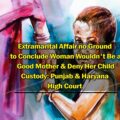
Amid the ongoing cricket match between India and Australia, a legal battle with a cricket connection is also underway in courtrooms. The divorce petition filed by Indian cricketer Shikhar Dhawan against his estranged wife Aesha Mukerji is being heard in a family court in Delhi. During the proceedings, the presiding judge, Harish Kumar, criticised an Australian court for making derogatory comments about the Indian judiciary and urged foreign courts to discard the notion that Indian courts are stuck in the pre-independence era.
The judge stated in a nine-page order that Indian courts are conducting proceedings through video conferencing whenever necessary. The judge emphasised that India gained independence in 1947 and has since made significant advancements in the application of technology in all areas of life. Therefore, no one should mistakenly believe that Indian courts are still in the pre-independence era.
The reason for the Delhi Family Court judge’s comments was a request by the Federal Circuit and Family Court in Australia on February 2. The Australian court had asked Shikhar Dhawan to withdraw the divorce petition he had filed in the Family Court at Patiala House in Delhi and submit to its jurisdiction. Dhawan’s estranged wife Aesha Mukerji, who is a Melbourne-based kickboxer, had filed for maintenance in the Australian court. Dhawan had filed for divorce and custody of their child in the Delhi Family Court.
The Australian court, in its order, had expressed ignorance about the functioning and decision-making process of Indian courts in parenting and custody disputes. It had also suggested that since both Dhawan and Aesha understood English, they could continue their legal battle in Australia, which has the provision of video conferencing. Therefore, the Australian court had directed Dhawan to pursue the divorce and child custody proceedings in Australia.
The Indian court strongly objected to the remarks made by the Australian court, claiming that they revealed an “improper comprehension of the law of India” concerning parenting and Indian conditions. The judge clarified that Indian courts issue parenting orders based on the child’s best interests, and it is incorrect to assume that the Australian court has better jurisdiction solely because it is unaware of how parenting disputes are settled in India. The order emphasised that the paramount consideration in such matters has always been the child’s welfare.
Furthermore, according to the judge, the notion that the Australian court is better equipped to adjudicate the parenting dispute because the parties are fluent in English is also indicative of the court’s ignorance about the Indian legal system. Judge Kumar emphasized that most courts in India, including those in New Delhi, conduct their proceedings in both English and Indian languages. Therefore, Aesha Mukerji would have no difficulty understanding and participating in the proceedings in India.
Regarding the territorial jurisdiction, Judge Kumar expressed the opinion that since both Shikhar Dhawan and Aesha Mukerji are Hindus, and their son Zoravar is also a Hindu, the Delhi court is the appropriate forum for them to pursue their litigation.
The judge highlighted that the marriage between Dhawan and Mukerji was conducted in accordance with Sikh rites in New Delhi and registered in India under the Hindu Marriage Act, 1955. Therefore, any dissolution of marriage has to be done under the same act by courts in India, or by a foreign court applying the Hindu Marriage Act, provided both parties have subjected themselves to the jurisdiction of the foreign court. Additionally, the judge pointed out that Mukerji had not raised any objection to the divorce proceedings under the Hindu Marriage Act and had subjected herself to the jurisdiction of the court under the same act.
The Court also stated that Aesha Mukerji cannot selectively choose the proceedings under the Hindu Marriage Act and is bound by it for all issues governed by it. The Court further observed that Mukerji had filed a plea for maintenance and other financial assistance before the Australian court initially and amended her plea only after the Delhi family court passed orders regarding parenting and custody issues.
Source: https://www.barandbench.com/news/litigation/india-vs-australia-family-court-delhi-hearing-shikhar-dhawan-divorce-case-rebuffs-comments-australian-court





